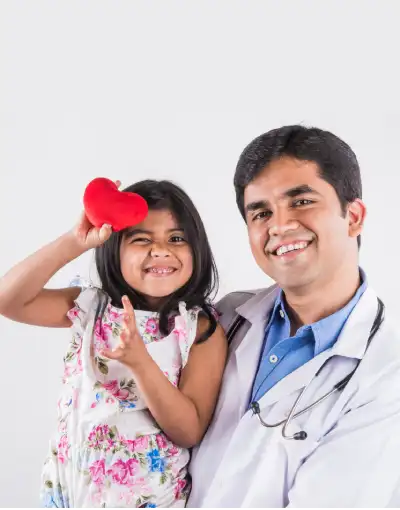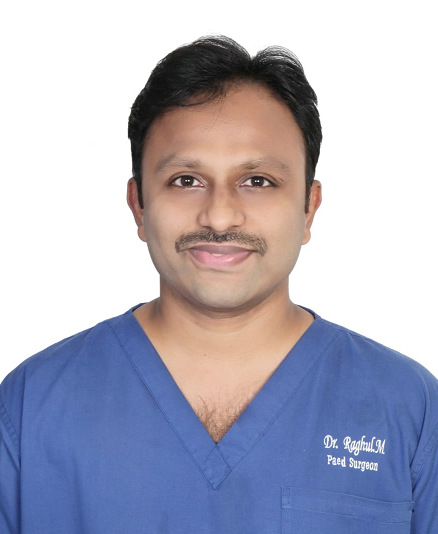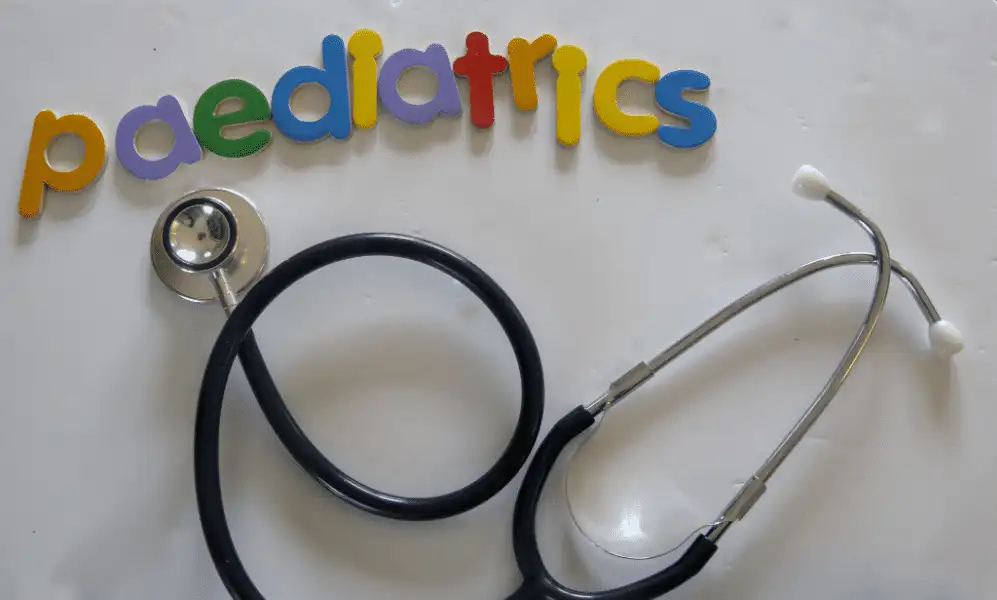Paediatric Surgery
The paediatric and neonatal surgery unit is dedicated to provide the best care to neonates and children who may need surgery for a variety for conditions involving the brain and spine, heart and lungs, respiratory and digestive systems.
Some of the procedures performed by our
Paediatric Surgeons
Some newborns may have a hole in the abdominal wall near the groin, which often closes on its own.
This is called an inguinal hernia.
If the hole does not close and is left untreated, there is a risk of the intestines coming out of this opening.
Hernia repair involves a simple surgical procedure to close the hernia.
The testicles are a pair of male sex organs that are found within the scrotum, which is the pouch-like skin below the penis.
The testes are responsible for producing sperm and the hormone called testosterone.
In some infants, the testicles may be inside the abdomen at birth and may not have descended into the scrotum.
The treatment for this is a surgery called orchiopexy, in which the surgeon releases the testicle from the original position and brings it into the scrotum, stitching it into place.
Orchiopexy can be an open surgery (by making an incision near the groin) or a minimally-invasive one (by using a laparoscope).
There are many congenital abnormalities that babies may be born with because of problems in the womb that affect the foetus growing inside.
One of them is an imperforate anus.
The anus is the opening at the end of the digestive system that allows a person to eject faecal matter from the body.
When the anus does not have a normal opening or if the opening is blocked or malformed it is called imperforate anus.
Surgery is necessary to repair this condition, wherein the surgeon may create an opening for the stool to pass. In severe cases, more than one surgery may be needed.
Hydrocephalus is a condition of the brain characterised by abnormal enlargement of the head in infants.
.
It is a congenital abnormality that occurs due to build-up of cerebro-spinal fluid in the cavities of the brain creating pressure..
.
It can lead to brain damage and even death..
.
There are a number of procedures that your surgeon might recommend to treat hydrocephalus, the most common being ‘shunt surgery’..
.
In this procedure a shunt (a small tube with a valve) is inserted in one of the brain’s ventricles and the fluid is allowed to drain out in the proper direction to relieve pressure on the brain…
.
Other procedures include ‘choroid plexectomy’ and ‘endoscopic third ventriculostomy.’
This condition is commonly known as the ‘hole in the heart.’
Ventricular Septal Defect is a birth defect seen in some infants wherein there is a hole between the two lower chambers of the heart (ventricles), which if left untreated may cause heart complications.
If the hole is very small it may not need any treatment, but larger holes warrant surgery. Similarly, Atrial Septal Defect (ASD) is a hole in the wall between two upper chambers of the heart (atria).
In a VSD/ASD repair, the surgeon will patch up the hole in the heart.
In recent times, the repair is done in a minimally-invasive technique, where a catheter tube-like device is passed through a blood vessel near the groin to reach up to the area of the defect and the surgeon closes the hole by placing a mesh at the site.
The ductus arteriosus connects the main aorta of the heart and the pulmonary artery so that blood can bypass the lungs in the foetus as the unborn baby does not breathe air.
But, once the baby is born this opening usually closes by itself so that the blood can go to the lungs to get oxygenated.
In PDA, the opening does not close and this endangers the infant’s heart.
To treat the condition, a paediatric cardiac surgeon may use various surgical techniques including minimally-invasive procedures (cardiac catheterization) to close the ductus arteriosus.

OUR DOCTORS
Meet Our Consultant's

Dr. RaghulMBBS, MS, DNB, FMAS, Mch</h5?
Consultant - Paediatric Surgeon
Session : Evening

About
Paediatric Surgery
Paediatric surgeons have the expertise to diagnose and treat birth defects and childhood medical conditions with the help of advanced medical and surgical care.
At Hindu Mission Hospital, newborns are screened thoroughly for birth defects and doctors conduct special counselling for parents of children who may have congenital abnormalities or serious medical conditions.
The aim is early detection and effective surgical treatment wherever necessary.
Signs that indicate you
should see a cardiologist
Difficulty In Breathing
Irregular Heartbeat
Signs that indicate you
should see a cardiologist
Difficulty In Breathing
Irregular Heartbeat



